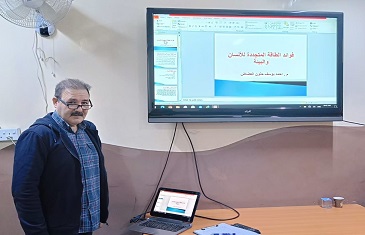
The Biological Research Unit for the Tropical Regions in cooperation with the Development and Continuing Education Unit at the College of Science, University of Baghdad, held a workshop tagged “Renewable Energy; Its Sources and Its Future Role”, sponsored by the Dean of the College, Assistant Professor Dr. Raed Falih Hassan, and attended several students, academics concerned with sustainable development.
The workshop aimed to familiarize with renewable energy and its types, sources, and benefits to human beings and the environment, describing that renewable energy is derived from constantly renewable natural sources such as the sun, wind, water and biomass, which differ from fossil fuels such as oil, coal and natural gas, which decrease over time and lead to environmental pollution.
The workshop included two lectures, the first presented by Dr. Hadil Mohammed Hussein, from the Faculty of Engineering-Department of Environment entitled “Achieving Sustainable Development: Contributing to Affordable and sustainable energy for Communities”, the second was presented by Ahmed Youssef Hanoun Al-Azaz, from the Biological Research Unit, which entitled “The Importance of Renewable Energy “, in which they addressed how renewable energy is a vital element in the fight against climate change and air pollution, demonstrating that they contribute to reducing greenhouse gas emissions, as the use of renewable energy reduces CO2 emissions and other harmful gases.
